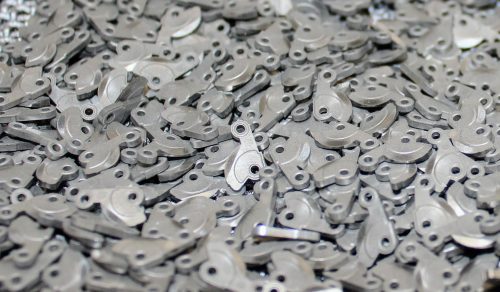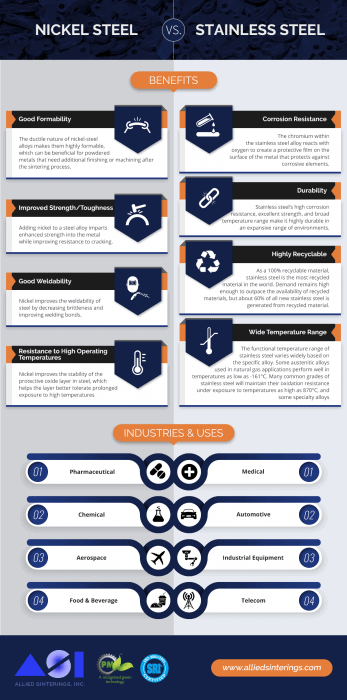Top Steel Grades for Manufacturing Miniature Components
Sintering uses pressure and heat to form powdered metal materials into a 80-95% solid mass without fully melting the metal. As the metal granules are pressed together, they begin to bond together the irregular particles to form a “green” compact. These compacts interconnected particles are then sintered to melt the particles together giving the component strength. Powdered metallurgy processes afford the ability to create small net shape parts with complex geometries while generating little waste.
Allied Sinterings, Inc. offers numerous varieties of powdered steel for creating small and miniature parts using the sintering process. This blog will highlight the two most common steel grades we utilize in this manufacturing process – stainless steel and nickel steel.
Advantages of Stainless Steel Components
A steel alloy containing more than 10.5% chromium is considered stainless steel. As one of the most widely used materials, stainless steel is a common base metal for powdered metal processes. The material offers numerous properties that make it an ideal material for producing powdered miniature components. Powdered stainless steel is available in multiple 300 series and 400 series grades.
Some of the beneficial properties of powdered stainless steel include:
- Corrosion resistance. The chromium within the stainless steel alloy reacts with oxygen to create a protective film on the surface of the metal that protects against corrosive elements.
- Improved strength. Stainless steel offers good strength and can support significant weight.
- Durability. Stainless steel’s high corrosion resistance, excellent strength, and broad temperature range make it highly durable in an expansive range of environments.
- Highly recyclable. As a 100% recyclable material, stainless steel is the most recycled material in the world. Demand remains high enough to outpace the availability of recycled materials, but about 60% of all new stainless steel is generated from recycled material.
- Wide temperature range. The functional temperature range of stainless steel varies widely based on the specific alloy. Some austenitic alloys used in natural gas applications perform well in temperatures as low as -161°C. Many common grades of stainless steel will maintain their oxidation resistance under exposure to temperatures as high as 870°C, and some specialty alloys can tolerate even higher temperatures.
Sintered stainless steel serves many different types of applications. The medical industry uses powdered metallurgy to develop precision stainless steel parts for critical medical devices. Automotive and industrial equipment often incorporate small, sintered parts, such as gears, as crucial components of larger products. The growing telecom industry turns to sintered stainless steel miniature components for highly complex devices.
The Benefits of Nickel-Steel Alloys
Adding nickel to steel alloys provides a variety of benefits, including:
- Good formability. The ductile nature of nickel-steel alloys makes them highly formable, which can be beneficial for powdered metals that need additional finishing or machining after the sintering process.
- Improved strength/toughness. Adding nickel to a steel alloy imparts enhanced strength into the metal while improving resistance to cracking.
- Good weldability. Nickel improves the weldability of steel by decreasing brittleness and improving welding bonds.
- Resistance to high operating temperatures. Nickel improves the stability of the protective oxide layer in steel, which helps the layer better tolerate prolonged exposure to high temperatures.

Custom Miniature Parts from Allied Sinterings
Stainless steel and nickel steel alloys have become very popular in powdered metallurgy, though selecting the appropriate type of metal for your needs can be difficult. Your sintering provider can help you determine the powdered metal material best suited to your design and specifications.
At Allied Sinterings, we specialize in custom miniature parts for commercial, industrial, and consumer markets. Using state-of-the-art technology in our environmentally controlled facility, our highly experienced technicians can handle virtually any custom powdered metal request, from assemblies and sub-assemblies to precision components for medical devices and process equipment. We can manage low- or high-volume production, offer short lead times on orders over 500 pieces, and can support rush orders when needed.
To see how we can support your project, please contact us today.




